Chinese Internet Reacts To Olympics Opening Ceremony
Please bear in mind: "When the forest is big, there are all kinds of birds." The following is just a sampling of Internet opinions, of which there are many. Please also bear in mind that Internet opinions do not represent those of the general population, because the people who care to comment on the Internet are a self-selected group.
(China Times via DWnews)
The Beijing Olympics opening ceremony had previously been shrouded in mystery and subjected to curious speculations. Last night, the mystery was finally revealed. But the mainland Chinese netizens did not react as expected, as negative reviews came pouring in. One mainland netizen said that the only appropriate word to describe the event was "boring" and the only sentiment was "disappointment."
Following the visit by Chairman Hu Jintao, the Strong Nation forum under People's Net has become one of the major Internet forums with the apparent status of the "official forum." Most people who visit that forum tend to be supportive of the government. But even at the Strong Nation forum, the number of detractors exceeded the number of supporters by a lot last night.
After viewing the performance, one Strong Nation commentator wrote: "What does China have except people?" Another commentator replied: "That is truly a unique Chinese characters. We have 1.3 billion people." "This kind of opening ceremony is possible only in China, because nobody else has that many people."
Because Zhang Yimou began as a cinematographer, he liked to play with lighting. The opening ceremony last night had important roles for the LED lights and laser lights. But some netizens thought that there was too much lighting and not enough persons made of flesh and blood.
The most acerbic criticism at the Strong Nation forum is about the "emptiness" and "vacuity." They described this as a work that represents this "ostentatious, flourishing era" and characterized the work as: "First-rate techniques, second-rate performances, no ratings for the content." At the more 'liberal' Tianya forum, the criticisms were even more blunt. Many people thought that the Beijing opening ceremony was inferior to Athens 2004 because the performance lacked a main theme, it used too many techniques and the content was incomprehensible to foreigners.
(Wei Yingjie at My1510.cn)
I watched the opening ceremony from start to finish. If the closing ceremony is to be included, then I would have watched more of this Olympics than any other one. The opening ceremony was the result of collective wisdom, but the style of Zhang Yimou is very apparent. Overall, it was very strong and very powerful. To achieve these kinds of effects is possible only in China, which has a state system that can attain perfection at all costs. My guess is that President Bush was shocked when he saw this spectacle, because he must be wondering: "If this was done in the United States, the taxpayers would have revolted."
Zhang Yimou took on this huge responsibility. The vista was grand and the visuals were stunning. I was impressed by the 2008 persons pounding the clay musical instruments and jars for that was mind-boggling, even though this reminded me of some of the movies that he directed. There are also other bright spots. For example, the dance of the Han letter blocks, the scrolls, etc. When you have this type of technology, you can make big movies. But there are some weak spots, such as <The Dream>, which Zhang Yimou personally felt good about. But if you can't think about it calmly, you cannot appreciate the meaning. The lighting of the Olympic flame by Li Ning took a bit too long, but it was the climax. I was truly moved by that moment.
Since this was a mass event, it was mainly about mass performances. Precisely because of this, the Olympics opening ceremony was truly suited for Zhang Yimou to direct. In the one-hour performance section, he expressed the aesthetics of nationalism thoroughly. In those dances, the dancers had no individual faces because they only mean something in the context of the group. In other words, in this group dance, the individual is unimportant and everybody has to to follow the group and consider the overall situation. The effects from these thousand-strong performance are so stunning. To make an inappropriate analogy, this is like an army moving in formation ...
(Song Shinan at Bullog.cn)
Zhang Zimou did not disappoint ss a "master" of the visual --he is a master who likes everything big and he successfully turned the open ceremony into an exciting temple festival.
We all know that Zhang Yimou likes "bigness." In <Hero>, we saw that he liked the "big unity." In <Curse of the Golden Flower>, we saw that he liked "girls with big tits." In the Olympics opening ceremony, we saw that he liked "big scenes."
Regrettably, these big scenes were empty and spiritless. This is like a mouth with a tongue cut off -- it does not matter how wide the mouth is opened because you can only hear some unclear moaning sounds.
I will now describe some funny parts in the opening ceremony.
When the state leaders entered, the music was actually the march of the athletes. The world must have been stunned. (By the way, when the team from Guinea entered after more than one hour later, the camera focused on Secretary-General Hu with the sub-title "Guinea"). They must be making fun of our handsome leader.
Later on, there were the clay musical instruments being played in a laser light show. This felt like rock n' roll, but actually it was the same thing as the gongs-and-drums show in the opening ceremony of the Asian Games that was held in Beijing. Zhang Yimou loves percussion instruments. But unfortunately, he only likes gongs and drums. Basically, the drums never stopped, not even during the tranquil episode with the Tai'chi exercise. In the end, it makes people want to smash the drums.
Zhang Yimou might have felt great about the big footprints created by electronic fireworks across Beijing. But I found it hilarious, especially when the big footprint rolled over the Mao Zedong memorial hall. How did Mao feel about his head being stepped upon?
The girls who danced on the painting wore black clothes like martial artists. They danced well, and they created a Chinese painting through their dance. But this was disgraceful, because what kind of Chinese painting was that? This was a child's scratchings! Even Crayon Shinchan could draw better than this.
This was followed by a bunch of guy chanting <The Analects>. Actually, they should have been chanting Chu poetry because these people were like priests praying at a funeral. At that moment, I thought that I was watching some ghost movie because the atmosphere was so eerie.
Up to this point, director Zhang had been showing that China is populous. Even he was embarrassed, so he sent out the showboat Lang Lang. I was ready to praise that, but immediately a group of Red Army-like people surrounded the piano -- we can never give up any opportunity to show that China is populous!
When the Taichi boxers showed up, I finally nodded my approval because there was finally an individual performance. But director Zhang quickly slapped me back into reality -- a mass of people ran around and around but they did not know how to form an Eight Diagrams figure. All they did was form one circle, without the Yin versus Yang. Director Zhang, have you seen the South Korean flag? Don't you know about the Eight Diagrams? Perhaps you don't want to give credit to the South Koreans, so you just settled with a circle.
Then we get into the part about presenting Chinese words. This is even more hilarious. Many people were used to form words such as "Huo ©M" and "Tea ¯ù" as if these are the essence of China. But if the Athens Olympics had used lots of people to form words such as "Venus" or "Ancient Greek sculpture," wouldn't you find that hilarious?
In the Silk Road portion, a small girl was being flown like a kite. I was delighted, because Zhang Yimou must be paying tribute to fellow director Chan Kaige for his human kite in <The Promise>. Who can forget that?
The introduction of folk dramas is an even bigger failure. The Beijing opera is not an art with many people involved, but here we are once again treated with a mass scene. The Kunqu opera was better because there were just two people, but the singing of the man was really too terrible. Yes, I don't understand the art of Kunqu, but the majority of the world probably have the same ears that I do. Why push this type of wretched yelling? (The female singer was better, but she sounded more like pop-singing than Kunqu.)
Finally, there is the Olympics song. Objectively speaking, the two singers have first-rate techniques. But Liu Huan was dressed like a peasant standing next to the Moon Goddess. This was like the legendary Wu Gang who chopped down the cassia tree, except that Wu Gang did not have a head as big as Liu Huan. Even more weird was that the Chinese lyrics of the song were pretty lousy. You cannot get something this bad even if you asked Guo Qingming or Wei Minglun to write the lyrics. Besides, the rhythm of the song was too slow and does not excite people. It was more like a choir hymn. When the athletes hear this song during the competition, they will fall asleep. They can play this during the marathon race, but it is unsuitable for other events.
The ignition of the Olympic flame was creative and it was the only bright spot of the opening ceremony. This invokes the ancient story of Kuafu chasing the sun. It was fortunate that the final torchbearer was Li Ning. If it was someone like table tennis player Zhang Yining, the suspension in the air would have just about killed her.
I should also state that the television comments were lousy. Apart from the bad scripts, the two commentators were running their mouths off. Sun Zhengping was introducing the nations. Towards the end, he said: "The next five nations will be Peru! We should give it the warmest welcome!" When Zhou Tao introduced the United States, he said that the Dream 8 team will play against China on August 8. I was astonished because I did not realize that Yao Ming and Kobe Bryant would go head-to-head as soon as they leave the stadium! I checked on the Internet and found that the actual date was August 10!
Actually, all of the above are details and not about the overall picture. The biggest overall failure is the attempt to avoid the earthquake factor like a plague. Yes, it would be overkill to find an earthquake orphan to ignite the flame and it would also be against many political considerations. But why not have one minute of silence before declaring the opening of the Olympics? Almost 100,000 lives were lost three months ago, and they don't deserve a minute of silence? Does the introduction of the earthquake factor based upon humanitarian reasons ruin the celebrative mood? Is the exhibition of mourning during the Olympics embarrassing to China?
The so-called "one world, one dream" must be based upon a humanitarian spirit. If there is no genuine concern among people, then all we see are people being moved to and fro. Now we see the Great Wall, now we see a mahjong tiles, but we cannot see any humanitarian spirit. In the opening ceremony directed by Zhang Yimou, we only see hordes of humanity except when the Olympic flame was ignited. When an opening ceremony has no people in it, how can it have any spirit?
The Olympics opening ceremony yesterday was really a fairly successful "show." But what is behind that "show"? What is it about Chinese culture that this show revealed? Or is it just a variety show that is westernised but produced better than the west can? The more I watched, the more I felt that is shallow and overplayed. This opening ceremony showed the strength of China, but it did not show Chinese culture! ...
As a friend in politics told me, the show put too much emphasis on the accomplishments of China at a time when the trend in the world is towards frugality, subtlety and low-profile. By contrast, this opening ceremony was too flashy and it may not be a good thing for China!
The Chinese Communists needs to affirm its accomplishments after the reforms, and many Chinese people have shone in their economic prowess. That is undeniably true, and there is every reason to be proud. But how much money was spent on this show? The Beijing City Olympics Economic Development Committee senior advisor Huang Wei said that the central government has invested 520 billion RMB on the Olympics since 2001. Although the expenses of the Olympics opening ceremony is less than 1% of that total, several hundred millions of RMB must have been invested to produce the four hours that was the opening ceremony. Over the next two weeks or so, the Chinese people will feel great that they have finally stood up. But after the Beijing Olympics is over, the problems of China will not disappear. The rich-poor gap will continue to exist, the people will still be deprived of their rights, the human rights problem will remain and corruption among government officials will continue to exist!
Has China really risen? ...
(DWnews)
... My overall feeling is one word: "Good."
I understand that mainland Chinese netizens are condemning it for not having flesh-and-blood persons.
This is what amateurs might say.
The Olympics is a sports festival in which the whole world takes part. The opening ceremony is the only ceremonial rite that all of human kind takes part in. Supposedly, more than 4 billion people will be watching this event on television. The only way to present to people of different cultures is to use audiovisual effects (such as light, color, sound and so on) to showcase Chinese civilization and to delight people.
What is the point of looking at flesh-and-blood persons? If you want to look at them, just go outside and sit by the roadside. You will be able to see plenty of them. At the 1996 Atlanta Olympics, they had small trucks with some cowboys on them. What is so good about that? If the street view does not please you, you can go home, take off your clothes and check out your flab in the mirror.
The Olympics is not a musical concert, and therefore singing and dancing are not the high points. If you insist on those kinds of performances, then Chinese pop songs/dances are not necessarily appreciated by the world. either The Olympics is not the Spring Gala Festival either, and so we should not bother with those traditional Chinese programs.
Director Zhang Yimou used colors, lights and flames to let the world come into contact with Chinese culture while enjoying the stimulation of the senses. It was done perfectly.
... The only flaw was that the CCTV broadcast has the names of Chinese leaders read out one by one. It is a good thing that the rest of the world didn't hear that, or else it would be the butt of jokes.
Finally, here are some striking photos from Olympics News (via Wenxue City and elsewhere)
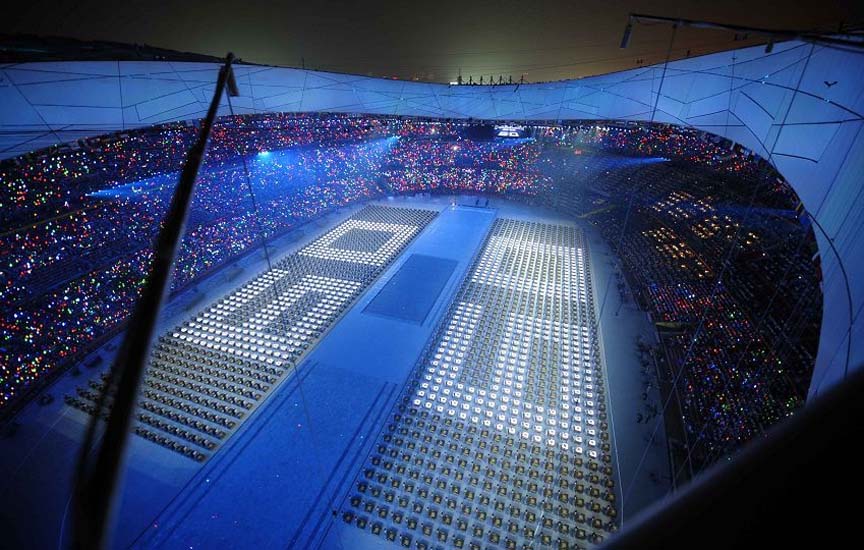

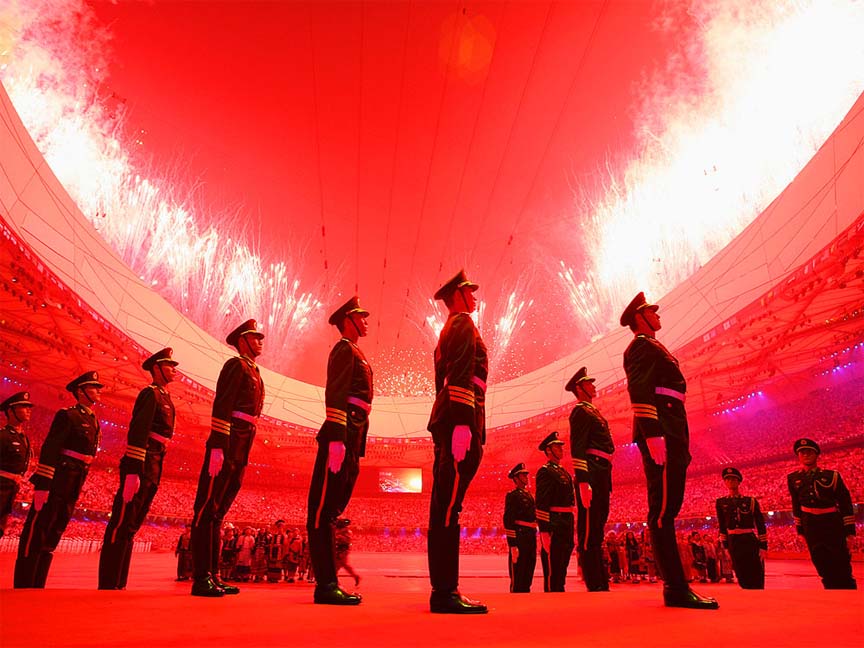

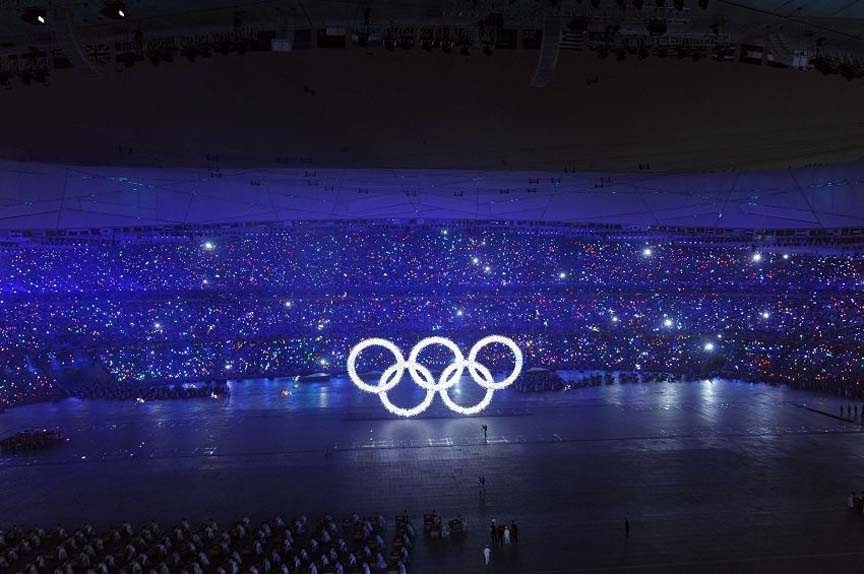

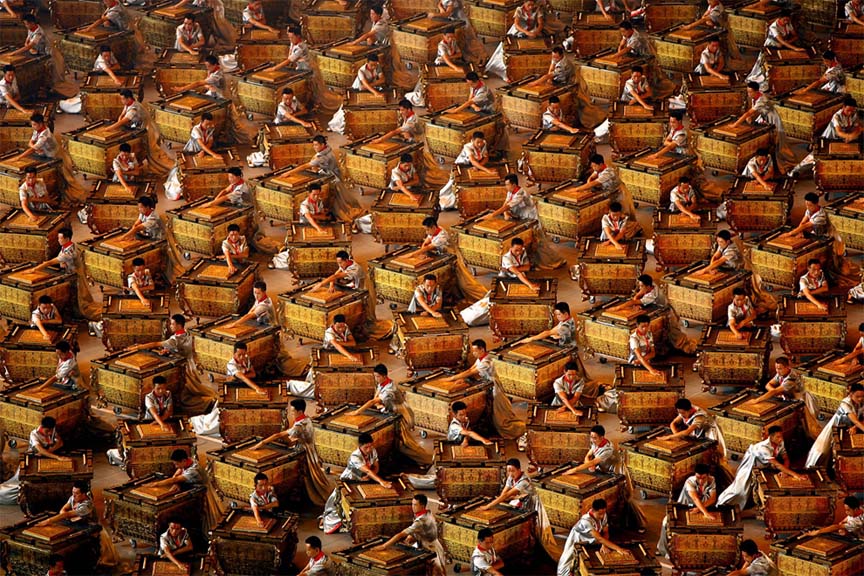




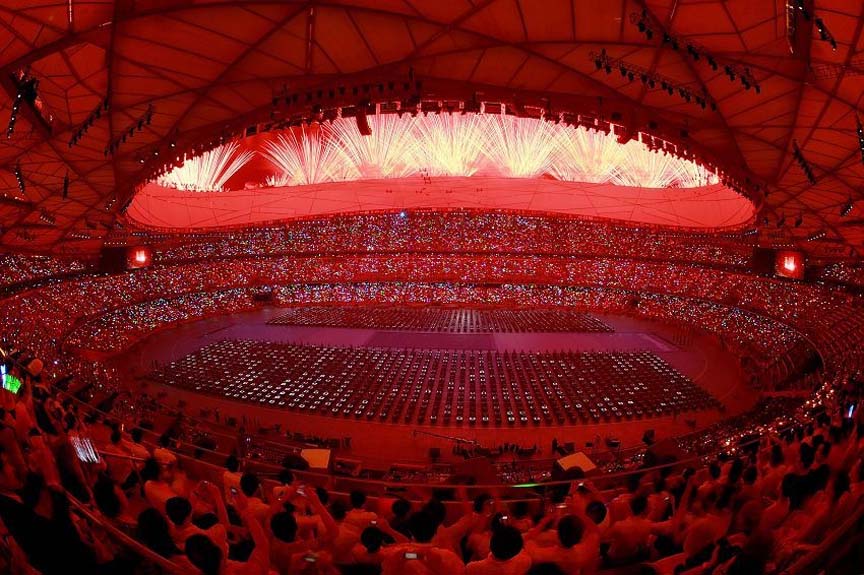
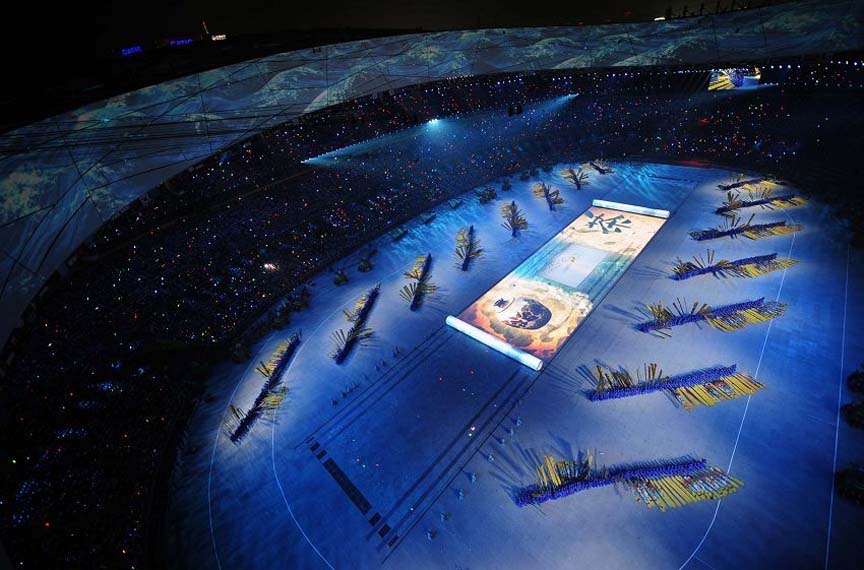
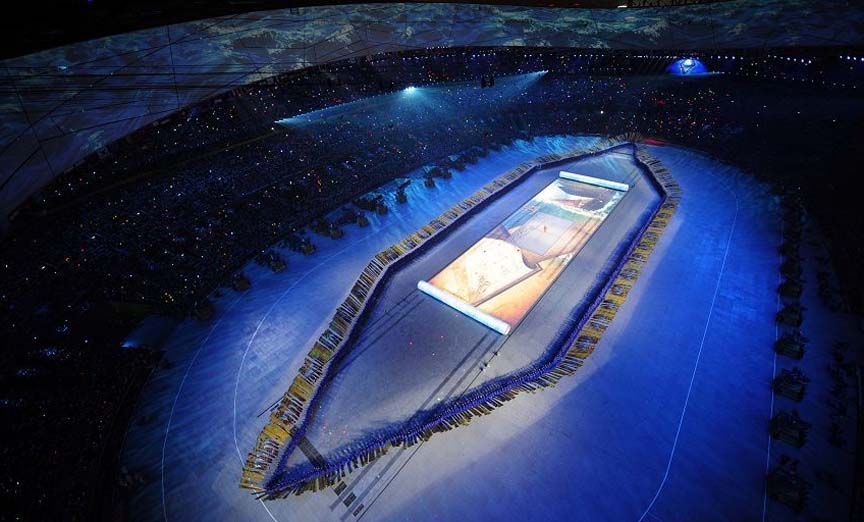

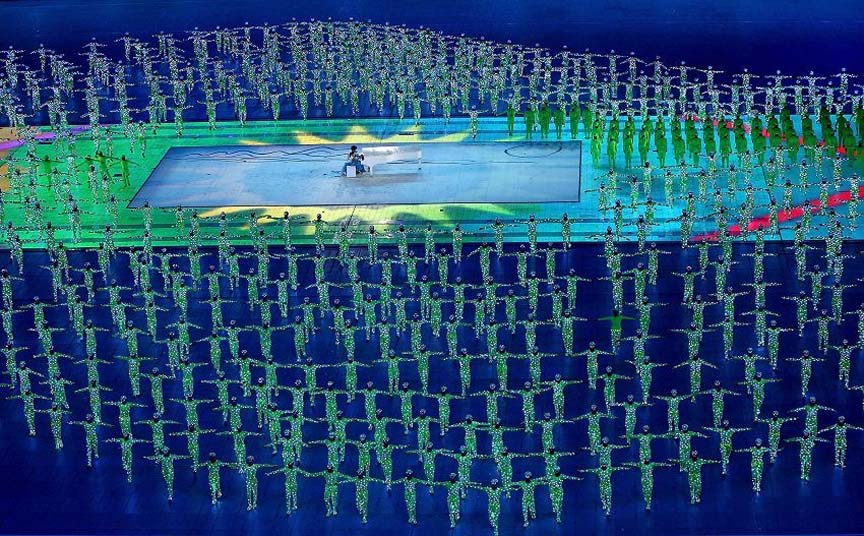
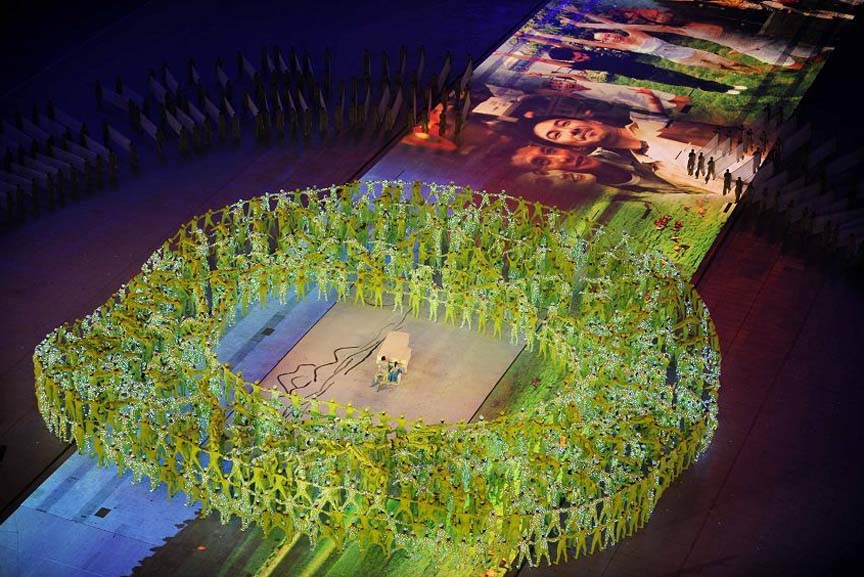
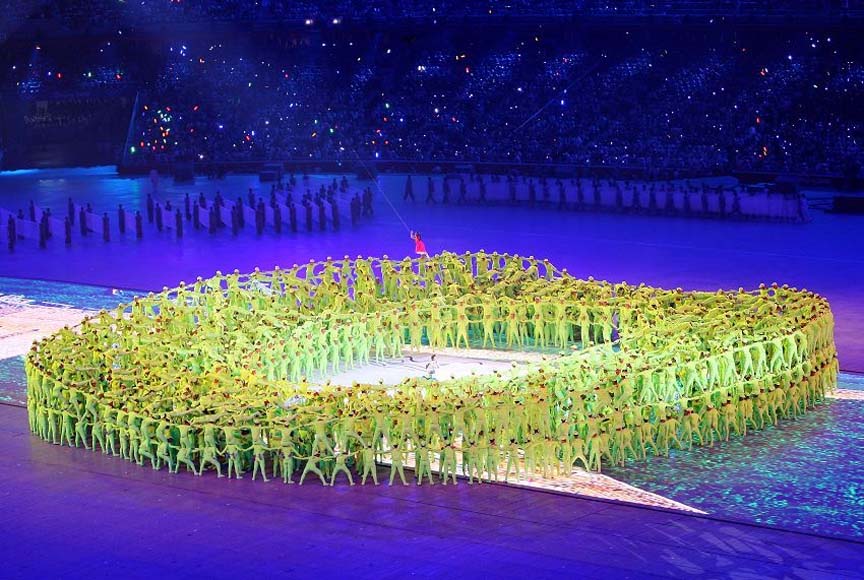
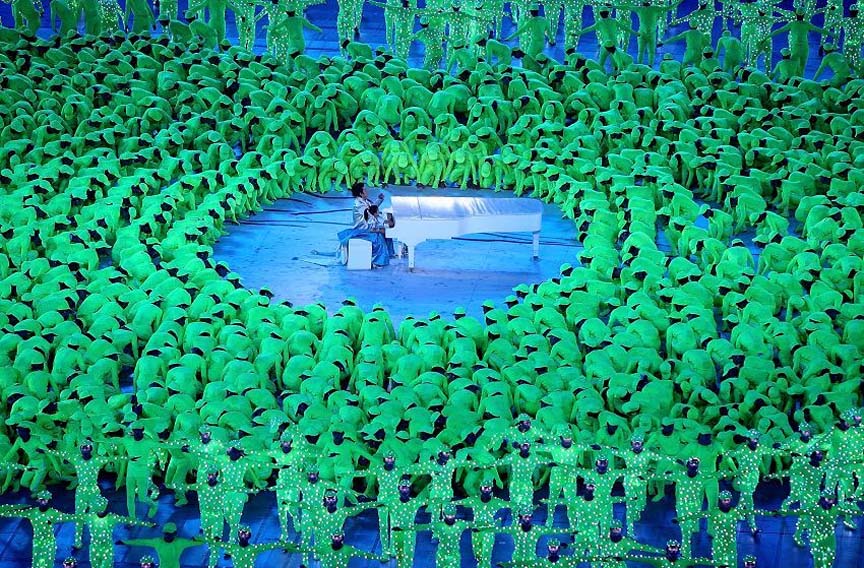
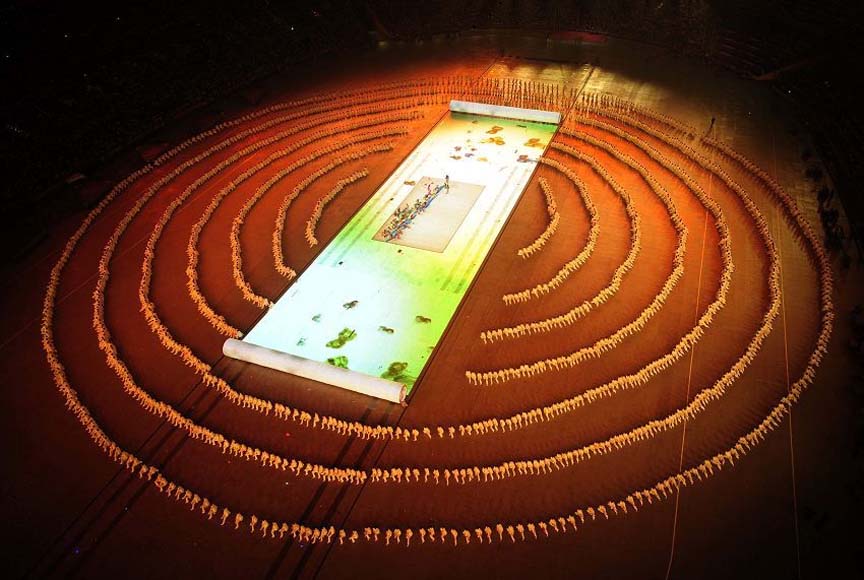
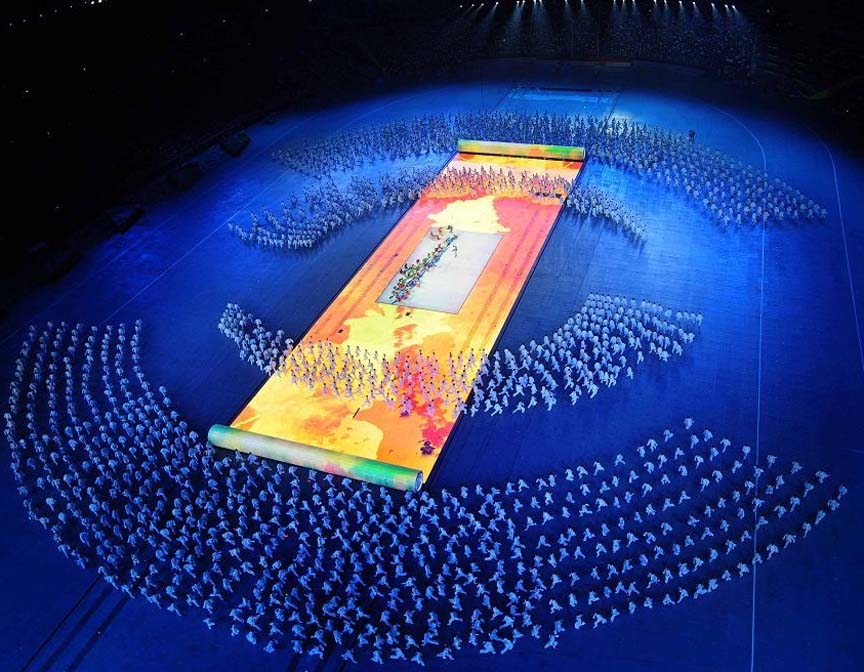


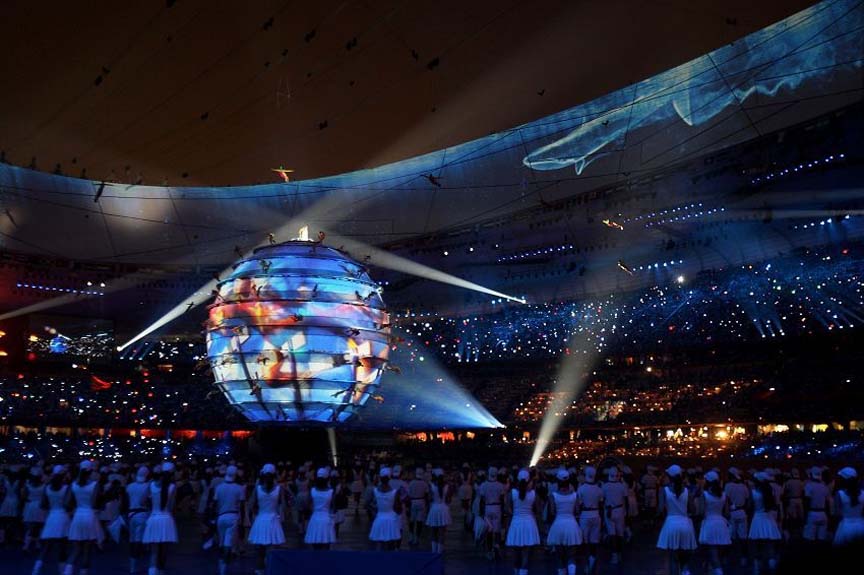
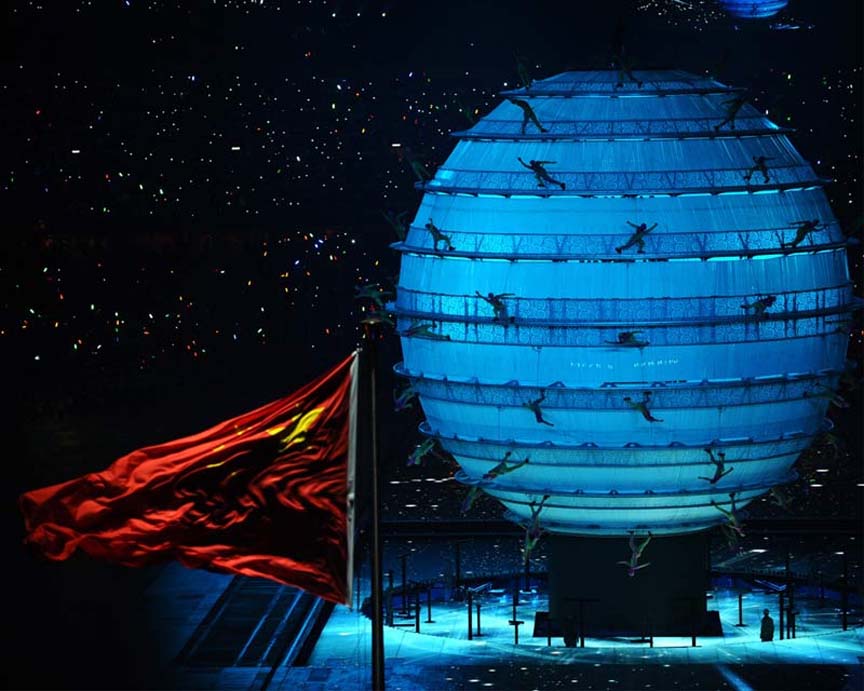
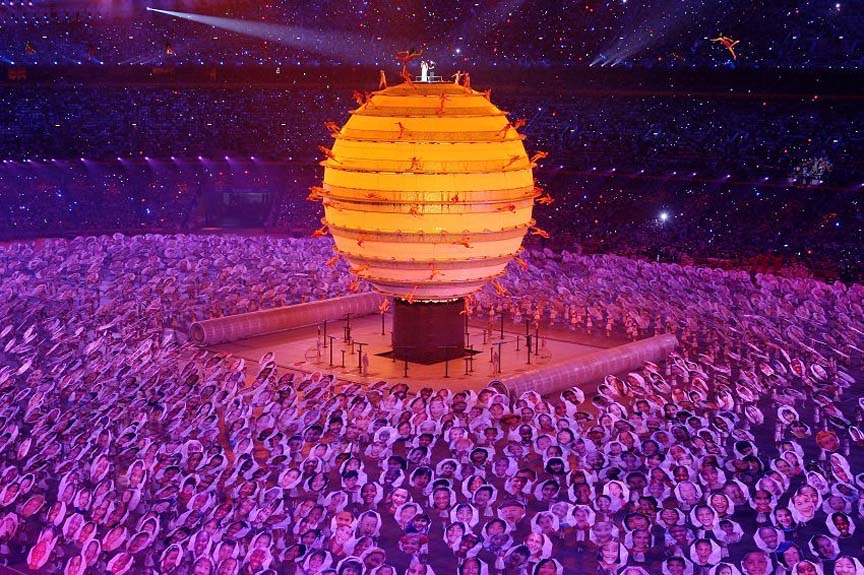
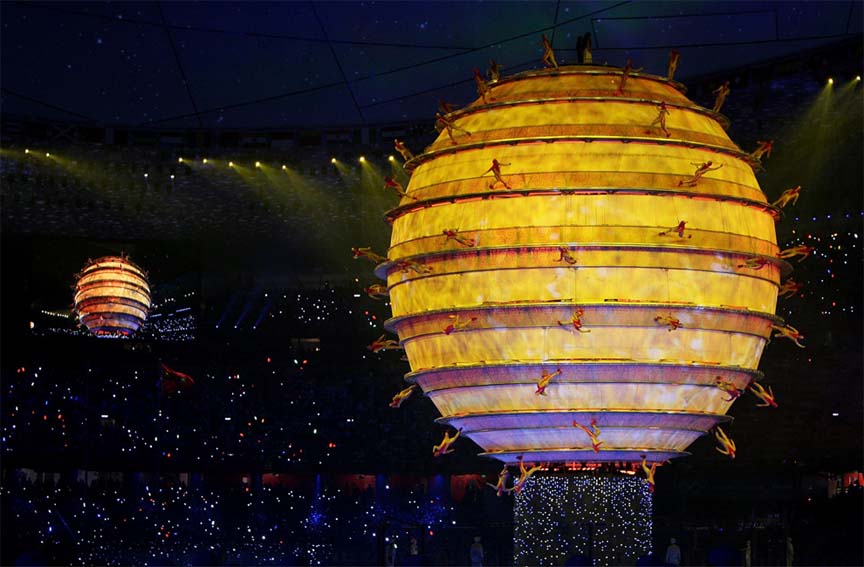
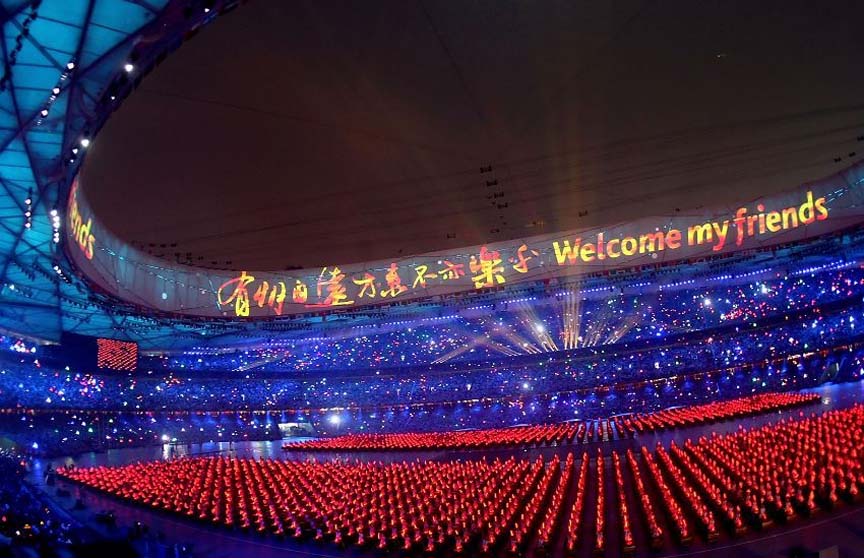

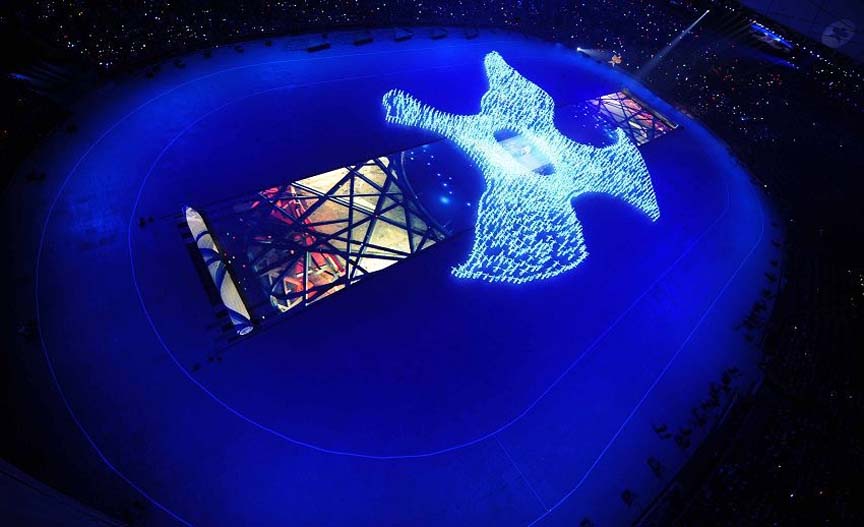
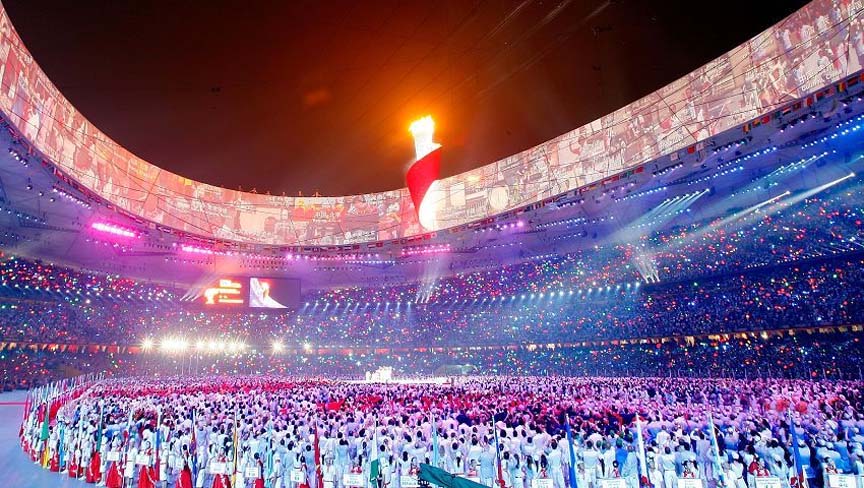

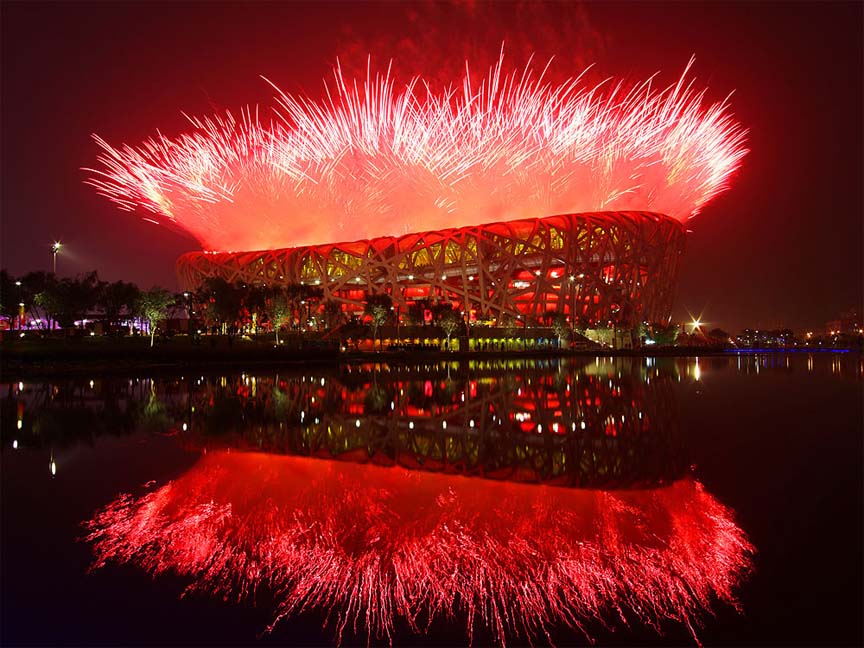
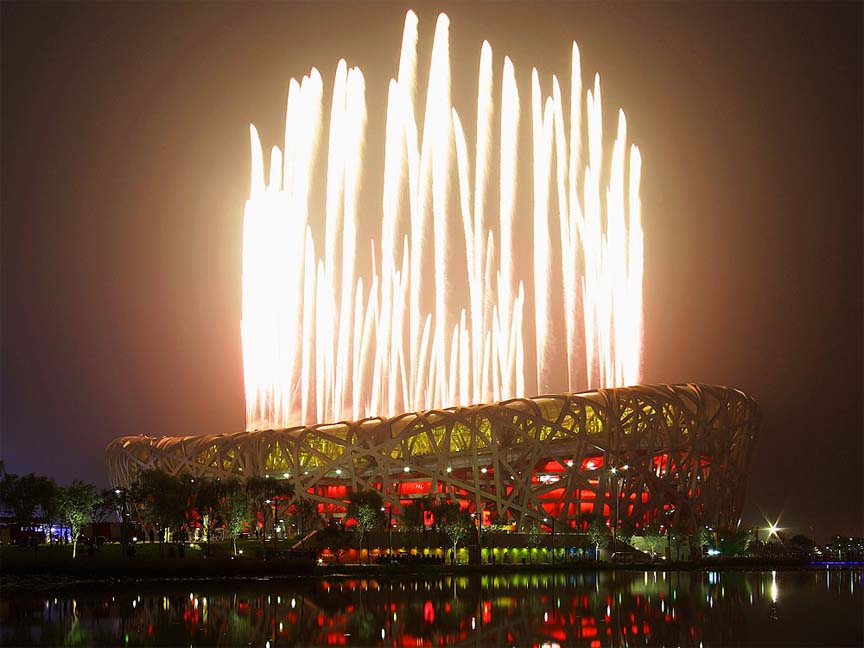
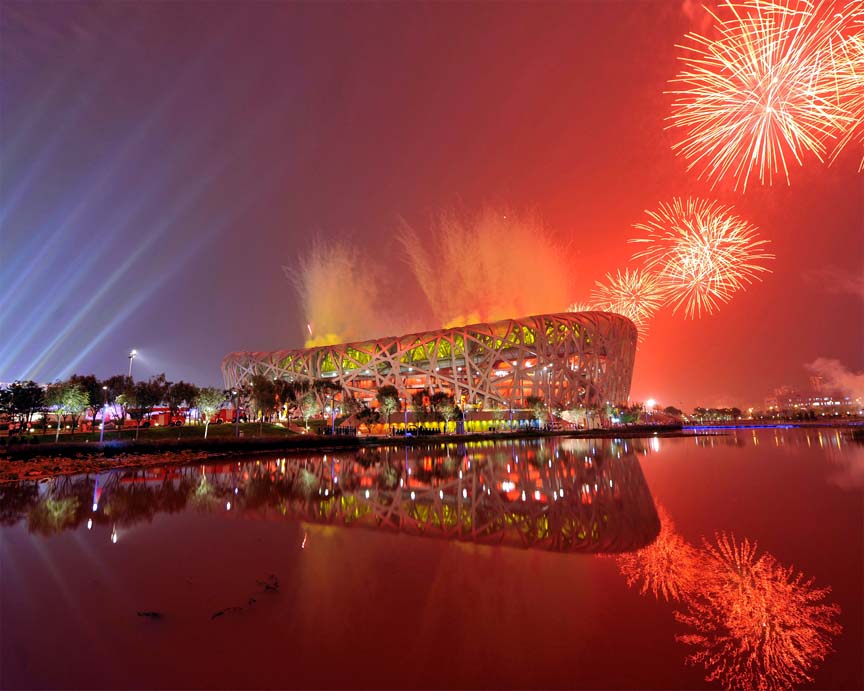
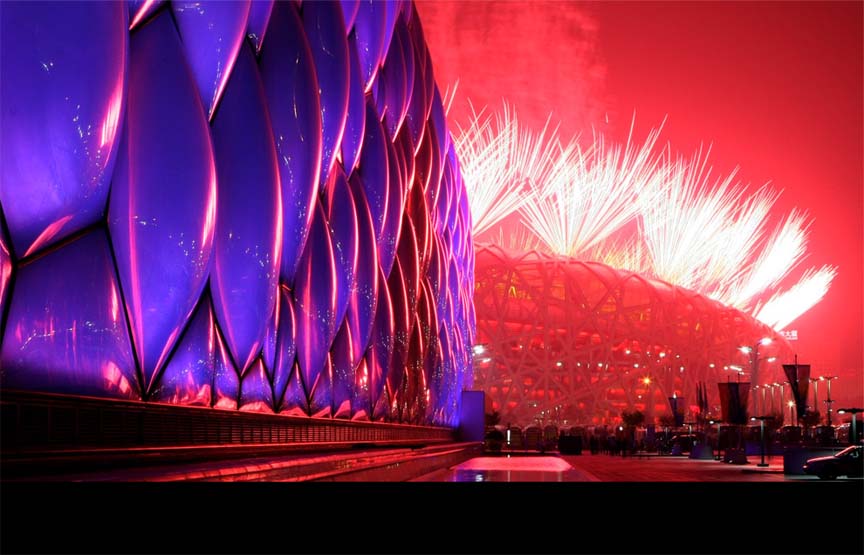
The reactions of ordinary Chinese citizens were covered in these western media reports. This is not quite what the netizens are saying, is it?
(New York Times) In Living Room, a Window Into the Games. Harvey Araton. August 9, 2008.
The flat-screen plasma television was purchased two weeks ago for the long-awaited night of pride and pageantry. It sat on a low-slung cabinet that rested against a living-room wall in a small, cramped apartment, as a symbol of modernity fronting a diminished vestige of the past, a screen of high definition framed by what had been a window of elaborate carpentry detail.
¡§Beijing,¡¨ Jacques Rogge, the International Olympic Committee president, would say on the television with his trademark solemnity as the long and lavish opening ceremony of the Beijing Games neared its conclusion, ¡§you are hosts to the present, and gateway to the future.¡¨ From his couch, Zhang Wei could also look back more than a century. ¡§That window is 120 years old,¡¨ he said, pointing to a complex weave of pinewood on the wall behind the big screen. It was all he could save from the house in the narrow Beijing alleyway known here as a hutong that Zhang¡¦s family had inhabited for 80 years.
The building was razed in 2000 to make way for an office tower, and the demolition changed Zhang Wei¡¦s life. He became an activist in the preservation of the hutong, if mostly through the lens of his camera.
¡§We try to find parts of our heritage and inform the government of things that can be done but we do not get feedback,¡¨ said Zhang, 31. ¡§What is lost is so much more than we can protect.¡¨ But such talk on the night that was supposed to be about all China had gained? With the start of the ceremony minutes away Friday night, Zhang¡¦s father had come in from the apartment across the hallway on the second floor of the austere building in the Shijingshan District on Beijing¡¦s West Side.
¡§Don¡¦t say that, don¡¦t say that,¡¨ said Zhang Yuewen, 62, the product of another generation, a protective dad who worried what bounds his son was overstepping. He became more relaxed, giddy even, when the subject changed to one that father, son and a healthy portion of China share a growing passion for.
¡§We love basketball,¡¨ Zhang Wei said. ¡§My father and I will be watching all the games.¡¨ ¡§Kobe Bryant, the Lakers, I am a huge fan, I only wish Yao Ming could be with them so he could win the championship,¡¨ the elder Zhang said while his wife, Fan Guixin, and Zhang Wei¡¦s girlfriend, Li Ying, settled in for the early fireworks display. Refreshments were served. An American journalist invited to watch the opening ceremony with a photographer and an interpreter were treated like part of the family.
By the time the big show began, all perceived societal flaws and bones of contention were on hold, would have to wait through a couple of more weeks and a trove of Chinese medals, although Zhang Yuewen guaranteed ¡X ¡§100 percent¡¨ ¡X that the United States would win the men¡¦s basketball gold, citing Bryant as the difference.
¡§I watch him all season and I see that he has matured, grown up,¡¨ he said. ¡§For two years, all he wants is to shoot. This last year, he is passing to the others.¡¨ Told that his assessment matched that of many experts in the United States, he shook my hand and asked if I could get him Bryant¡¦s autograph. I promised to see what I could do and we both laughed. I¡¦d made a friend.
The more I come to the Olympics, and this is my 10th, the more I agree with Rogge: the Games are too bloated ¡X though not with sports, as he has maintained, but with self-aggrandizement, the belief in itself as a great global agent of peace. The Olympics are more of a big, messy party that always has the potential to create as much acrimony as harmony. We should probably stop expecting too much and maybe, from that context, we can grudgingly come to grips with the unmet promises of the Chinese authorities and enjoy these Games, remember that they are also for ordinary folk like the Zhangs, and how excited and proud they are to have them.
Friday night, I asked Zhang Yuewen, a former steel factory worker, about China¡¦s women¡¦s volleyball victory in the 1981 World Cup that is considered the rebirth of Chinese sports after the Cultural Revolution. He nodded vigorously. ¡§Even now I can feel the excitement from the volleyball victory,¡¨ he said. ¡§We celebrated because at that time many years ago we didn¡¦t have much entertainment to watch.¡¨ Now, along with the Lakers, he has the Olympics. He (and David Stern, no doubt) considers that progress.
When they played the Chinese national anthem Friday night, Zhang Yuewen swayed gently and mouthed the words. Bryant, his favorite Yank, would soon be coming at the back of the large American delegation as it marched into the architectural triumph they call the Bird¡¦s Nest, followed later by Yao leading in the Chinese team.
It was easy to imagine families like the Zhangs in their modest homes all across China, on their couches, leaning forward, galvanized by the realization that it was time for the basketball games and the Beijing Games to begin.
(The Guardian) Stronger, faster and better - a people's pride in its power. Jonathan Watts. August 9, 2008.
A huge police and paramilitary presence kept the public off Tiananmen Square last night, but tens of thousands thronged the streets around the giant concrete esplanade, hoping to share in their country's emergence as a great power. Although the giant TV screens around the political centre were disappointingly blank, huge crowds spilled into the Wanfujing shopping district in the north and the swanky Qianmen boulevard to the south, drawn by the promise of celebratory fireworks.
Old laobaixing - common folk - in vest and shorts mixed with peasants visiting from the countryside of Anhui, Henan and Inner Mongolia, and at least one student with a Mohican. Many sported I heart China T-shirts, red national flags, face stickers and bandanas with the slogan that has become the chant of 2008: Zhongguo Jiayou (Add Fuel China!).
The expression, used as a "C'mon China" cheer in football games was heard in rallies supporting the torch relay in April and after the national mourning ceremonies for the victims of the Sichuan earthquake. Today, the crowd said it had a different meaning: "It means get stronger, get faster, get better," said Du Zibing, a military man who led the crowd. "The Olympics is a chance to help foreigners to better understand our country."
Du said he wanted the outside world to realise life was better than in the past. "I have two cars," he said. "One with an even number plate, one with an odd." This meant he said proudly that could drive every day during the Olympics despite traffic controls that restrict vehicles to travel on alternate days so that there are fewer exhaust fumes.
Ask people what they are celebrating and the main answer is a better life and the chance to show the world how much China has changed. Three decades since the country began its reform policy, the laobaixing can now enjoy a lifestyle that was unimaginable for past generations.
On a low wall on a back street, Jiang Minfu is taking a breather between fireworks after travelling further than ever before in his life. The 72-year-old farmer arrived in Beijing only two days earlier from Sichuan, where he said the recent devastating earthquake had claimed far fewer lives than the famines of his youth. "When I was a child, we stole food from the dog's bowl," he recalls. "The Olympics shows how much power we now have. The change has been huge. We used to have oil lamps, now we have electricity."
His son, Jiang Shunjun, is evidence of the change. Wearing a Kappa top, Nike trainers and several gold rings, the 45-year-old boasts that the family now have a big home and several apartments that they rent out.
Bright future
"Coming to the Olympics is a chance in a 100 years. Even though the earthquake destroyed many houses, I felt confident in my heart because our economy is good and I have enough money to bring my father and daughter to Beijing."
When the youngest generation of the family, 22-year-old Jiang Yuanyuan, reaches her grandparents age, there is every chance that China will have overtaken the US as the world's biggest economy. "China will get stronger and bigger," she said. "I feel China has a bright future. We are hard-working and united so I believe things will get even better than they are now."
The new generation is not just more patriotic. They are wealthier, more globalised and far more connected to the rest of the world by technology.
When we finally find a screen showing the opening ceremony, it is just four inches wide. Cai Xiqing, a 22-year-old, shares a peek at her mobile phone TV. "It was very cheap," she says of the device, made by domestic manufacturer Tianyu, "Only about 1,000 yuan." That sum - about £75 - would have been more than half the population earned in a year when the crowds last thronged to Tiananmen in 2001 to hear Beijing granted the right to host the 29th games of the modern age.
On the tiny screen, Cai watches vast ranks of performers, in the same armoured garb as the terracotta warriors, in the centre of the Bird's Nest. "This shows the greatness of our 5,000 years of history," she says proudly. "I feel so proud I was born Chinese."
As well as national pride, people made it clear that they saw the Olympics as a chance to welcome the world.
There were few foreigners in the crowd, but those that turned up said the atmosphere was welcoming. "There is a real warmth. People are very proactive about welcoming us," said Di Kendall, from Nottingham, bedecked in a union flag, who travelled to Beijing with a friend on the trans-Mongolian railway. "I think they are delighted to be showcasing the Olympics. We have had people come up to us in the street, touching us, holding hands. It's always nice when people meet you half-way and here it feels as if people are meeting us all the way."
But the festivities were mixed with tension. Police and paramilitaries cleared the side-roads of crowds in between the bursts of fireworks that marked the beginning and end of the opening ceremony. There had been small protests by foreign human rights activists on the square the previous day. The Qianmen shopping district - opened only days before - had been mired in controversy because of the forced evictions that preceded the demolition of the old hutong alleyways that stood here, and the spectre of the protests in 1989 has never gone away completely.
But for the vast majority of those gathered for the festivities, such problems for the minority were unimportant compared to the progress made by the majority, and the chance to chant with pride "Zhongguo Jiayou!"
(Los Angeles Times) China flocks to TV screens to share Olympic pride. Ching-ching Ni. August 9, 2008.
They might not have tickets to the Games. They might never set foot in a stadium. But wherever there was a TV screen, big or small, the people of Beijing on Friday gathered and cheered, soaking up this brief moment in the long history of this ancient capital when the Olympic flame illuminated the Chinese sky.
Despite suffocating heat and the threat of a summer shower, locals poured into designated parks and viewing areas, grandparents and babies in tow, some waiting hours for a foothold among the standing-room-only crowds of thousands that roared past midnight.
"I am so proud to be Chinese tonight," said Ju Ke, a 19-year-old animation student who got a front-row seat on the grass of Ditan Park before two giant monitors.
As the spectacular opening ceremony began and a little girl in a red dress sang a popular tune on the screen in praise of the motherland, tears welled up in Ju's eyes.
"China has made so much progress in recent years," she said. "Chinese culture is so amazing. The Olympics are so hard-earned."
All the years of waiting and sacrifice seemed worth it when the Games finally began at eight minutes past 8:00 on the eighth day of the eight month in the eighth year past the second millennium, a moment seen as auspicious by the Chinese.
"This is such a huge deal for Chinese people," said Li Shengli, 78, a white-haired grandfather and retired electrician who had passed out eight times in the heat since showing up at the park after lunch to get a spot where he could sit. "I don't know if I can live long enough to see the next Olympics. So I had to be here, to participate, to show I care."
"Look at the spirit of these people. Isn't it exciting!" said Liu Jianhua, 57, a neighbor of Li, as young people around him with red flags painted on their cheeks chanted in unison, "Go, China, go!"
Bus driver Liu Fengyun and his wife, Yang Guixin, traveled by train here 10 days ago from a small town in northeastern Liaoning province. Even though they could not afford tickets to the competitions, they had to be in Beijing to be as close as they could, to bear witness. "We were both born in 1949," said Liu, referring to the year the communists took power. "We are the same age as China."
The Chinese have "probably been preparing for this day since Deng Xiaoping opened up China to the world," said Nicholas Martelli, a Chinese-language student from Italy who also had waited hours to see the show on the big screen, along with a group of spectators from Spain.
Just outside Ditan Park, a barbecue restaurant was packed with folks who didn't want to watch the festivities at home or feel left out.
"I've been told to stay away from the Bird's Nest because we are not locals and we have no tickets," said He Daifu, 37, a migrant worker who sometimes helps tear down old buildings to make way for new construction projects like the ultramodern Bird's Nest, formally called the National Stadium.
Li said as he shared a beer and roast lamb with a buddy: "I am a peasant by birth. These Games are not for people like me. Good thing there are TVs."
Outside the park, the streets of Beijing were eerily empty. The government gave people the day off to reduce congestion. Some major thoroughfares were blocked to traffic unrelated to the Games.
Zhang Bin lives in a historic neighborhood in the shadow of the Confucius Temple where many people still reside in crowded courtyards without indoor plumbing. He had wanted to buy fresh fish to cook Friday night for his family as they watched the festivities on TV. But his corner vendor no longer had fresh produce or meat because the delivery trucks, like other old, smog-spewing vehicles, were being denied full access to the roads as officials sought to clean the air for the Games.
But his 60-year-old father, Zhang Ziyan, didn't think their small troubles were worthy of complaint.
"This is a once-in-a-lifetime event," he said. "We need the Olympics to be a success. We want everybody in the world to feel our happiness."
(Washington Post) For Chinese, A Long-Awaited Occasion of Hope and Pride. Maureen Fan. August 9, 2008.
Hours before the first performers began entertaining the crowd Friday, a doctor from Sichuan province sat on the curb outside the iconic Bird's Nest stadium with his 7-year-old son, waiting to go in. He had no water, no umbrella, to protect him from the sun; those had been banned for security reasons. His wife could not join him on the curb; she was barred from entering the neighborhood because she had no ticket.
But Huang Biao was armed with a brand-new pair of binoculars, a $286 camera and a giddy sense of hope and pride about the Opening Ceremonies of the Beijing Games.
"I don't have much expectation for the singing and the dancing, but from the behavior of the athletes and the volunteers, I hope they can show the new look of China," Huang said, smiling broadly. "Definitely there will be nothing like China's old 'sick man in Asia' image."
With more than 80 heads of state in attendance, the epic production was much more than an advertisement for China's economic and athletic prowess. Many Chinese saw it as heralding a resurgent empire.
"The rise of China is not a dream anymore," said Zhang Teiwang, 50, joining the 91,000 other spectators leaving the Bird's Nest after an extravaganza that lasted four hours and 10 minutes.
All across the capital, ordinary people watching the long-awaited Olympic kickoff said the event presented to the rest of the world a strong, unified China whose time had finally come.
Huang Jisu, a playwright and deputy chief editor of International Social Science magazine, didn't care for the music but said the ceremony's message was one of survival.
"The Olympic songs, I don't feel very good about. It sounds like some prostitutes are trying to attract business," he said. "But China has walked out of national crises and reached today's achievement. We are going to attend the world affairs and write the history of the world together with other countries. China has been reborn, instead of being very careful in front of foreigners."
In a narrow hutong alley, dozens of neighbors gathered at a local shop to watch the ceremony on a small TV set that had been turned to face into the street. After an outdoor dinner of peanuts, chicken's feet and bitter melon, the crowd dwindled to Li Yuming, who sells goods on the Internet, and shop owner Chi Heli, both 32.
"Did you know China's population is 1.3 billion?" Chi said. "It's not easy for China to develop to this level with that big a population. This is the first time we've hosted such a big world event."
The ceremony showed the nation's newfound strength, Li said.
"Right now, the country is rich and people are strong, and we Chinese are really standing up," Li said. "Twenty years ago, no matter where we Chinese stood, people looked down on us. But now no one dares to invade us anymore."
For many people, the emotional highlight was the entrance of China's 639-member athletic delegation, the country's largest ever and the biggest team of these Games.
"Everyone is crying out, 'Go, China!' I feel the park is going to explode," said Liu Jian, 29, a composer who watched the ceremony in Ditan Park.
Audiences cheered loudly for Hong Kong and Chinese Taipei, as Taiwan is referred to at the Olympics. They applauded loudly for allies such as Pakistan and Cuba, for soccer nations Brazil and Spain, and for Iraq. In Ditan Park, there were no discernible boos for the United States or Japan, both targets in the past of virulent expressions of Chinese nationalism.
When a towering Yao Ming entered the stadium at the head of the Chinese delegation bearing a giant Chinese flag, thousands of people sitting on every available inch of pavement rose to their feet screaming and cheering until their faces were red. "Their voices can't be any louder. Some of these girls have tears in their eyes," Liu said.
As much as government leaders hoped to impress the rest of the world, much of Friday's pomp was directed at a domestic audience.
In a year of challenges, from the Tibet riots and the Sichuan earthquake to fears about rising housing prices and a stock market crash, officials used Confucian elements in the show to help portray a "harmonious society." The catchphrase is meant to evoke President Hu Jintao's legacy but underscores Communist Party concerns that an unhappy public is a threat to its power.
Several intellectuals said the Opening Ceremonies reminded them of the Berlin Olympics in 1936. "The Berlin state wanted to show an Olympics in which all countries take part, that their power is a legal, legitimate one, that they can bring prosperity and splendor to the country," said Chen Yongmiao, a dissident writer and former lawyer.
Unlike other countries, Beijing has been able to close factories by fiat and order motorists to drive on alternate days, in an effort to clear its smoggy skies. Traffic was mostly light Friday as a government-imposed day off kept many people at home.
Security was so strict around the outside perimeter of the Olympic Green that sidewalks below a large outdoor screen were filled not with ordinary citizens but with Olympic volunteers and journalists. Shortly before the ceremony started at 8:08 p.m., a computer mouse could be seen trying to adjust the brightness on the outdoor screen. But then it went blank.
The small crowd didn't seem to mind.
"After China experienced so much trouble this year, China is still very strong and we Chinese want to use our best face to welcome the world," said Liu Jing, 20, a university freshman and volunteer. "For local Chinese, the government just wants to create a happy atmosphere. The Olympics will make you forget a lot of troubles, no matter if you're a high official or an ordinary person."